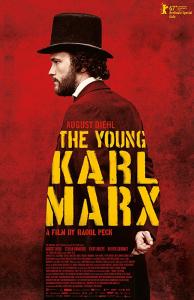The movie opens in the midst of Europe’s Industrial Revolution around 1840. The German and French underground intelligentsia writes and publishes furiously about social and governmental ills. Karl Marx (August Diehl) is a liberal who supports the working class and Friedrich Engels (Stefan Konarske) is the son of a rich factory owner in Manchester, England. The film chronicles their first rather antagonistic meeting and their lifelong friendship, Marx’s marriage and family (his wife is played by Vicky Krieps who stars with Daniel-Day Lewis in the Oscar-nominated film “Phantom Thread”), and Engel’s romance with a factory worker and later her sister.
The story leads up to Marx’s and Engels writing “The Communist Manifesto” in 1848. It also tells of Engels writing “The Condition of the Working Class in England” (1845). Engels’ original research methods are shown in a sympathetic even compassionate light; both Marx and Engels are shown as philosophical agitators who live rather comfortably.
The contrast of their lives with all the death and destruction caused by the implementation of their ideas in the 20th century make it hard to see director and co-writer Raoul Peck’s (“I Am Not Your Negro”) film as much more than a congenial and conventional portrayal of what Variety’s reviewer, Owen Gleiberman, called a “bromance.”
Neither Marx nor Engels in this telling is a monster. Marx is a husband and family man (who later in life would be supported by Engels.) The only real insight into their philosophy of materialism and the evils of capitalism is that Marx supports an equal distribution of goods. There is no hint of the horror to come because of their writings and athiestic philosophies. I think these ideas deserved more elaboration in the film given the long tentacles of their influence over almost two centuries.
I appreciated the film insofar as it told the story of the men’s friendship and collaboration for social change in times of oppression. But little did they seem to know that they were teaching the oppressed to become the oppressors. Neither of these men really suffered in life, though Marx struggled. The acting is good, the story is easy to follow and you may come away with more information about two pivotal and influential characters of the 19th century than you had going in.
In German and French with English subtitles.













